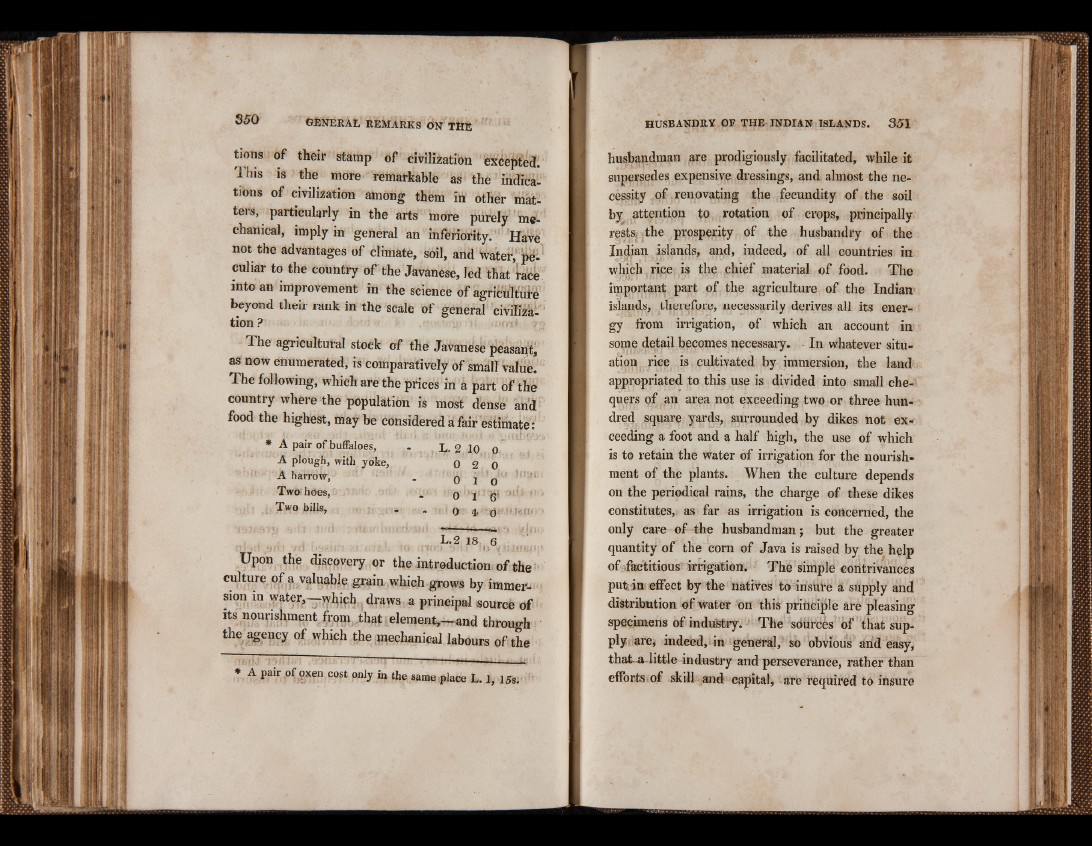
tions of their stamp of civilization excepted.
This is the more remarkable as the ’ indications
of civilization atnong them in other matters,
particularly in the arts more purely me-
chanical, imply in general an inferiority.’ Have
not the advantages of climate, soil, and Water, ¡peculiar
to the country of the Javanese, Jed that lace
into an improvement in the science ofagriòultufè
beyond their rank in the scale of general civifizk-
tion ?
The agricultural stock of the Javanese peasant,
as now enumerated, is comparatively of small value.
The following, which are the prices in a part Of the
country where the population is most dense and
food the highest, maybe considered a fair estimate?
* A pair of buffaloes, .. T. g jq q
A plough, with yoke, 0 2 0
A harrow, . 0 l Q ,;
Two hóes, © i 6‘ v-’; ' v
Two bills, - ■ . ■ _ 0 it O' '
L .2 18 6
Upon the discovery or the introduction of the
culture of a valuable grain which grows by immersion
in water,-—\yfnçh draws a principal source of
its nourishment from.,that element,—and through
the agency of which the mechanical labours of the
* A pair of oxen cost only in the same place L. 1, 15s.
husbandman are prodigiously facilitated, while it
supersedes expensive dressings, and almost the necessity
of renovating the fecundity of the soil
by attention to rotation of crops, principally
rests, the prosperity of the husbandry of the
Indian islands, and, indeed, of all countries in
which rice is the chief material of food. The
important part of the agriculture of the Indian
islands, therefore, necessarily derives all its energy
from irrigation, of which an account in
some detail becomes necessary. In whatever situation
, rice is cultivated by immersion, the land
appropriated to this use is divided into small chequers
of an area not exceeding two or three hundred
square yards, surrounded by dikes not exceeding
a foot and a half high, the use of which
is to retain the water of irrigation for the nourishment
of the plants. When the culture depends
on the periodical rains, the charge of these dikes
constitutes, as far as irrigation is concerned, the
only care of the husbandman; but the greater
quantity of the corn of Java is raised by the help
of factitious irrigation. The simple contrivances
put in effect by the natives to insure a supply and
distribution of Water on this principle are pleasing
specimens of industry. The sources of that supply
are, indeed, in general,>! so obvious and easy,
that a little industry and perseverance, rather than
efforts of skill and capital, tare required to insure